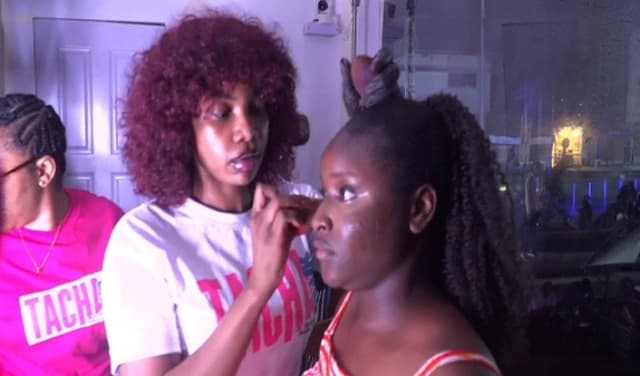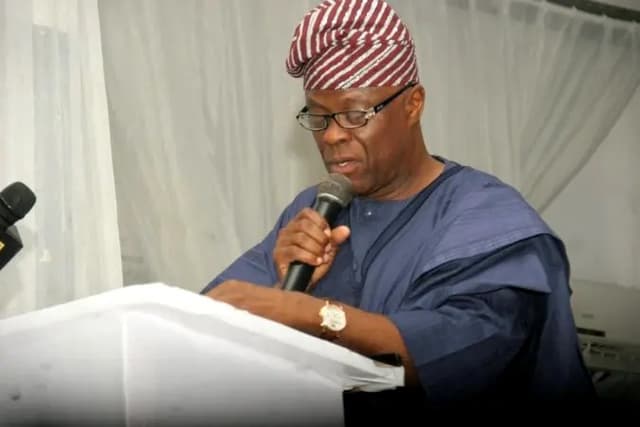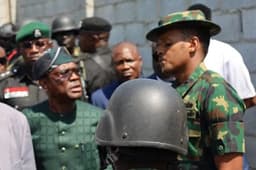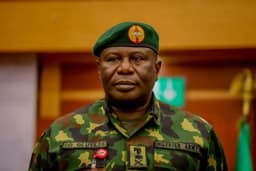
Governor Fubara
As the Rivers State Governor, Siminalayi Fubara, resumed duty after a six-month layoff following the emergency rule declared in the state by President Bola Tinubu, DENNIS NAKU pictures some of the hurdles before him
The saying that ‘uneasy lies the head that wears the crown’ aptly describes the situation the Rivers State Governor, Siminalayi Fubara, currently finds himself in.
Though Governor Fubara is the chief security officer of the state, at the moment, he is in a dilemma where going forward is as difficult as going backward, to ape the words of renowned Ghanaian poet, Kofi Awoonor, in his legendary work Songs of Sorrow.
With the end of the emergency rule in the state and the return of the democratic structures, Fubara and the lawmakers are back in office with a train of events already playing out.
For the immediate past administrator of the state, Vice Admiral Ibok-Ete Ibas, he has ‘successfully achieved’ the mandate assigned to him by President Bola Tinubu, majorly priding himself as the man who supervised the August 30 local government elections conducted under his watch by the Rivers State Independent Electoral Commission led by Dr Mivahel Odey.
Needless to say, in the chairmanship and councillorship polls, the All Progressives Congress won 20 of the 23 local government areas, while the ruling party in the state, the Peoples Democratic Party, won the remaining three, with Governor Fubara losing his Opobo/Nkoro LGA to the main opposition party.
As of now, all the elected chairmen and councillors have been given their Certificates of Return by the RSIEC, and all the 23 council bosses sworn in by the former administrator, and thereafter, assumed office.
The conduct of the council elections followed a Supreme Court judgment, which nullified the exercise conducted by RSIEC under Fubara.
The implication is that Wike has reclaimed the local government structures and the state House of Assembly, where 27 of the lawmakers are loyal to him, Including the Speaker, Martin Amaewhule.
With Wike now firmly in control of the political structure of the state, it remains to be seen how his estranged godson survives as governor without holding any of the aces.
It goes without saying that the LG chairmen — the 20 who are members of the APC and the three others from the PDP, all loyal to the FCT minister — pose a challenge to the reinstated governor.
A more serious hurdle for the governor is the Amaewhule-led Assembly, which held its first plenary on September 18 with clear messages to the governor, which sound like déjà vu.
The lawmakers had sat in the conference room of the legislative quarters located along Aba Road, a temporary place of legislation, as work was still ongoing at the Assembly Complex along Moscow Road, which was demolished at the height of the political crisis in the state.
The Assembly resolved to write to Fubara, requesting him to forward the list of commissioner nominees for screening and confirmation.
The House also called on the governor to submit the Rivers State Appropriation Bill, while noting that members will review how funds were spent during the six months of emergency rule, as well as review the expenditure of the state during that period.
Amaewhule, during plenary, said, “This House has resolved to keep to the terms of the peace pact with the governor and all stakeholders.”
On his part, the FCT minister said, “As for me, anything that will bring peace, I’m for it.” However, a certain school of thought believes that it is easier said than done because, to all intents and purposes, the feeling of mutual suspicion hovers — and rightly so — a constant companion amongst the dramatis personae.
To say that Wike, though in Abuja, not only keeps spies around his political godson but also monitors developments in the oil and gas-rich state, is to state the obvious.
Commenting on the matter, the Chancellor of the International Society for Social Justice and Human Rights, Omenazu Jackson, said achieving synergy under the present circumstances between the local government chairmen and the House of Assembly was possible for the progress and development of the state.
He advised the governor to stoop to conquer by applying wisdom, saying, “As the chief executive of the state, the governor can say, ‘Gentlemen, this is my line of thinking; this is where I want you people to intervene as local government chairmen.
“House of Assembly members, please, this is the vision of my government, please queue up to it. Areas you feel are ambiguous, please call my attention to them. I will straighten it and make an explanation.’”
He continued, “As long as the intentions of the organs of government and the institutions of democracy are in tandem with the aspirations of Rivers people, there is no issue.
“But if they add selfishness to their duties, that is where there will be issues. The governor has the right to chart a vision for the state because it is within the prerogative of his right and mandate as the executive governor of the state.
“So, when he charts a course, every other person is supposed to queue into it. With this ambiguity, he should be summoned to make an explanation. But I will continue to say and repeat that democracy doesn’t accommodate bullying.
“Nobody should bully the governor, and the governor should boldly defend the sacred mandate given to him by the state.”
On his part, a lawyer and human rights advocate, Mr Higher King, said he did not foresee any crisis in the state before the 2027 election.
King said, “The reason is that for all the parties — Assembly members, the local government chairmen, the governor, and the FCT minister — I don’t see them having any crisis going forward, because what happened under the emergency rule affected all of them.”
The lawyer explained that all the parties in the hitherto crisis, including the governor, the lawmakers, the local governments, and Wike, were affected by the emergency rule one way or the other.
He further said, “So, I don’t see anybody ready to disagree. Going forward, they will be concentrating on getting their tickets between now and September 2026 ahead of the 2027 general elections.”
Buttressing his point, he said the tone of the House and their resolution during Thursday’s plenary is the way to go.
“The governor and the House of Assembly members just resumed, and you can see what the House said: come and present this and that. We want to work together. They are talking gentlemanly now. Everybody is talking with respect for each other right now. So, I don’t see any crisis.
“I see the governor taking control and calling the shots, and I don’t see anybody disturbing him. Even Wike wants to consolidate Rivers State. So, he won’t want a crisis.
“But going forward, I can tell you that by this time next year, most of them will not be together again. All the Assembly members, Wike, and even Fubara himself — by this time next year — may not be together, because there are going to be marriages, divorces and all that, and everybody will be thinking about his political future rather than having disagreements or crises.”
He maintained that the parties, ahead of the next election, would be looking at what favours them, insisting that the governor “will still have his powers. So, everybody will come to him. Even the President of Nigeria needs him.
“The governor will be a rallying point. Everything that has happened has happened — maybe for a purpose — for the governor to now assert himself, show who he is. I don’t see the governor being intimidated by anyone.
“He is the one who will intimidate people instead. Even the President will be looking for his own ticket, and his own ticket is even dicey right now.”
The state Chairman of the Civil Liberties Organisation, Sunny Dada, said the governor needs to be intentional in cementing the reconciliation and healing process to be able to survive.
Dada recalled how the political crisis occasioned by the disagreement between Wike and Fubara polarised the state along ethnic lines; hence, setting up a truth and reconciliation committee was the way to go to allow people to ventilate their grievances.
He said, “The crisis ruptured the peaceful architecture of the state and also deepened the mistrust between ethnic nationalities in the state. You know that there is a traditional mistrust between upland and riverine ethnic nationalities.
“This mistrust is politically known as the upland-riverine dichotomy. So, moving forward, one of the key steps that the governor should take is to set up a truth and reconciliation committee.”
Dada noted that the committee should be made up of people who are impartial and have impeccable character.
“People with integrity, to be headed by a retired judge who has not taken sides in the crisis,” he said, noting that the crisis had so deepened to the extent that it permeated every fabric of society.
“You know that is why today, we no longer have elders that you will say are not aligned to any of the factions; even religious leaders were caught up; some civil society organisations were also caught up.
“So, as part of his first step towards resolving the crisis in the state, the governor should set up this truth and reconciliation committee where ethnic nationalities will sit down and tell one another some bitter truth,” Dada further said.
He explained that key actors would also be called upon to explain their part or roles in the crisis so that at the end of the day, everybody would truly reconcile and move forward.
The state CLO chairman described the Abuja peace agreement which President Tinubu mediated as a photo op, as it cannot be said to mean peace. He added that indicators were showing red and capable of plunging the state into another round of crisis.
He posited, “That Is why we shouldn’t rest on our laurels as citizens, as Rivers people. We need to prioritise this suggestion — that there is a need for this truth and reconciliation committee. Then some persons genuinely lost one or two things to the crisis — such persons should be compensated.”
Another part of the governor’s action to move the state forward, he said, was for him to open up the financial books of the state.
He stated, “Under Ibok-Ete Ibas, the state finances were run as if it were his personal business. We didn’t know how much came in. Yes, though the monies that came in through FAAC were published and advertised, what about the internally generated revenue?”
Dada said under the emergency rule, there was a lull in governance, adding, “So, we need to know how much came in, how much he (Ibas) even met when he came to the state as the administrator?
“Now that he has left, how much did he leave behind? What and what did he spend money on? So, this is very important.”
He, however, urged the governor to suspend the budget and come up with a new Appropriation Bill, thus corroborating the views of the human rights advocate that the Assembly had started on a good footing.
“We are happy that the state Assembly has started on a good note by demanding a new appropriation bill. This is what we have been saying, and this is what we want to see. More importantly, the political gladiators should learn to forgive one another,” he advised.
Dada emphasised that they should open their arms, welcome one another and put the interest of the state on the front burner above their personal interests.
“Yes, as politicians, we know that they have their personal ambitions to pursue, but the idea of sacrificing the ultimate interest of the state just because they want to achieve individual or personal ambitions is not acceptable.
“So, this is the time for them to put on the toga of statesmen and ensure that the interest of Rivers State is elevated above personal sentiments,” he stressed.
Elder statesman and convener of the Coalition of Rivers State Leaders of Thought, Sunny Chukumele, in an interview with Saturday PUNCH, said that although the emergency rule has ended, Fubara is no longer in charge as his predecessor, Wike, has successfully captured the state.
Chief Chukumele indicated another challenge Fubara might face with three of his loyalists in the state House of Assembly, who opposed the Speaker, Amaewhule, and the 26 other legislators loyal to Wike.
“You know, we are not excited because I keep saying that it is like going back to Egypt. It’s a journey back to Egypt. So, for the House of Assembly, I don’t know what to tell them. I wish them good luck.
I wish the governor and the so-called House of Assembly good luck. For me and us, it is predictable. It is predictable that the governor of Rivers State, once so loved, has been lost to the capturers of the state,” he stated.
He expressed worry over the fate of three lawmakers who supported the governor during the political crisis in the state, saying they might be sanctioned by the Speaker, Martin Amaewhule.
However, only time will tell if the newfound unity among these political gladiators will be sustained before the 2027 general election. (Sunday PUNCH)



























NEWS EXPRESS is Nigeria’s leading online newspaper. Published by Africa’s international award-winning journalist, Mr. Isaac Umunna, NEWS EXPRESS is Nigeria’s first truly professional online daily newspaper. It is published from Lagos, Nigeria’s economic and media hub, and has a provision for occasional special print editions. Thanks to our vast network of sources and dedicated team of professional journalists and contributors spread across Nigeria and overseas, NEWS EXPRESS has become synonymous with newsbreaks and exclusive stories from around the world.